The Emotional Impact of Live Theatre: Insights from 5,000 UK Adults
What if theatre wasn't just entertainment, but an emotional infrastructure for modern life?
The theatre has long been seen as a cultural treat, a way to escape, unwind, or enjoy a good story. But new research from London Theatre Direct and Joyfulness suggests it's much more. A new study of 5,000 UK adults suggests theatre may play a more powerful role in our emotional wellbeing than previously thought.
For many, live performance isn't just a pleasant night out. It's a joyful ritual. A mental reset. A space for real emotion in a world that often feels disconnected.
The Study
To explore theatre's emotional impact, London Theatre Direct partnered with wellbeing company Joyfulness and the research arm at YouGov.
Together, we surveyed a nationally representative sample of 1,043 UK adults, alongside an internal study of over 3,000 regular theatregoers. The goal? To map the emotional impact of live performance across the country.
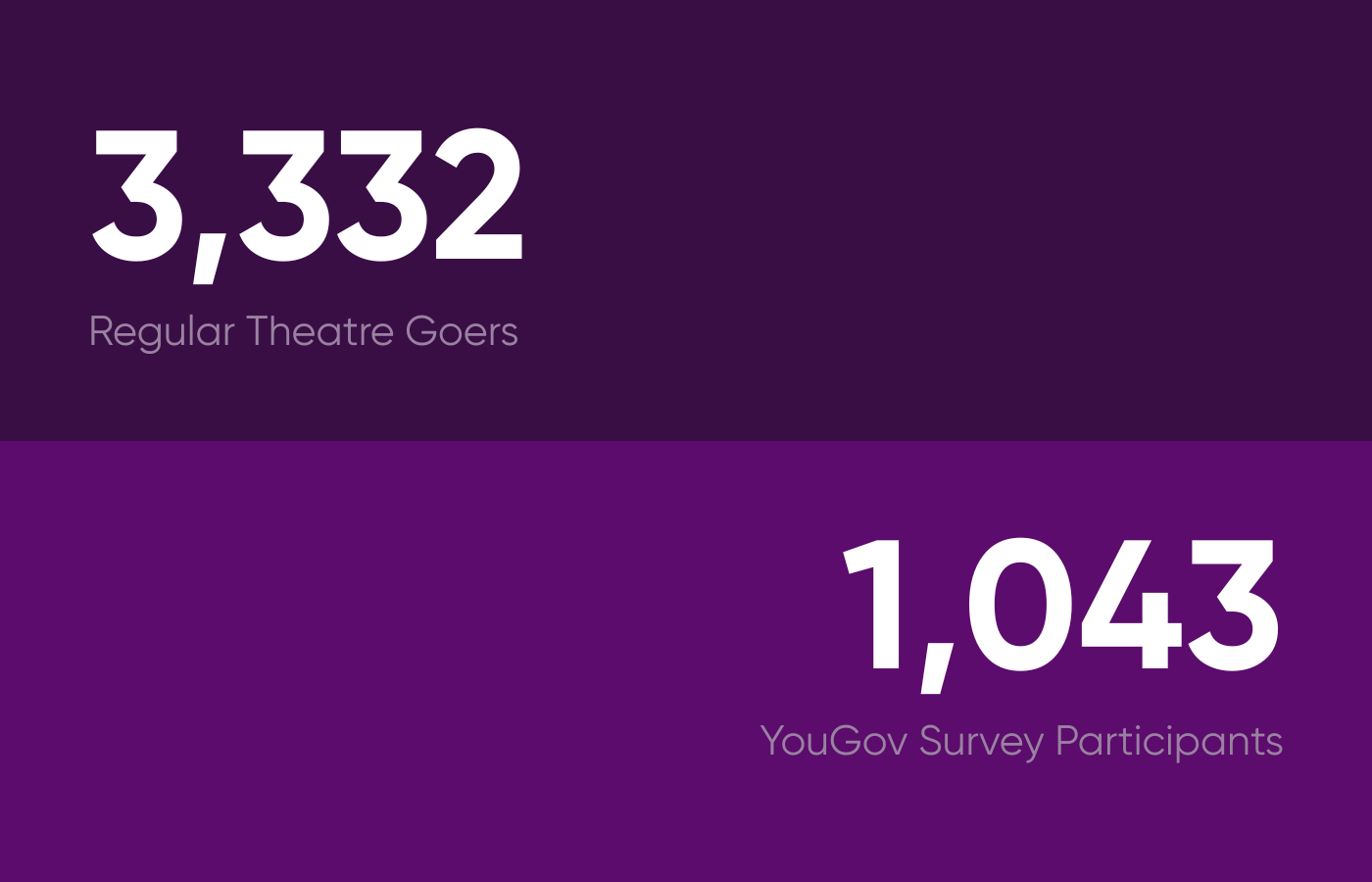
Theatre ranked higher than both cinema and clubbing as a joyful activity, especially among women, older audiences, and higher-income groups.
Some of the findings were not novel to our team - we know first-hand that theatre is powerful stuff. But even our team of theatre super-fans were surprised by the resounding voice that theatre sparks conversation, helps audiences process feelings, and offers a rare break from the digital world.
For some, it's comfort. For others, clarity. For many, a way to feel more deeply and connect more fully.
This report traces those emotional threads to offer a new perspective on the performing arts: with theatre not only as entertainment, but as emotional infrastructure, a vital public space for joy, introspection, connection, and everything in between.
More Than Just a Night Out: Theatre as a Top Source of Joy
Before diving into theatre's emotional depth, we started simple: what kind of night out does theatre offer?
According to our nationally representative YouGov survey, the answer is clear; a joyful one.
More than one in four people (26%) ranked theatre as a joyful night out, beating cinema (21.9%), clubbing (6%), and live sports (10.7%). It challenges old assumptions that theatre is niche, formal, or less exciting than other options. Instead, it's a night out that entertains and uplifts.
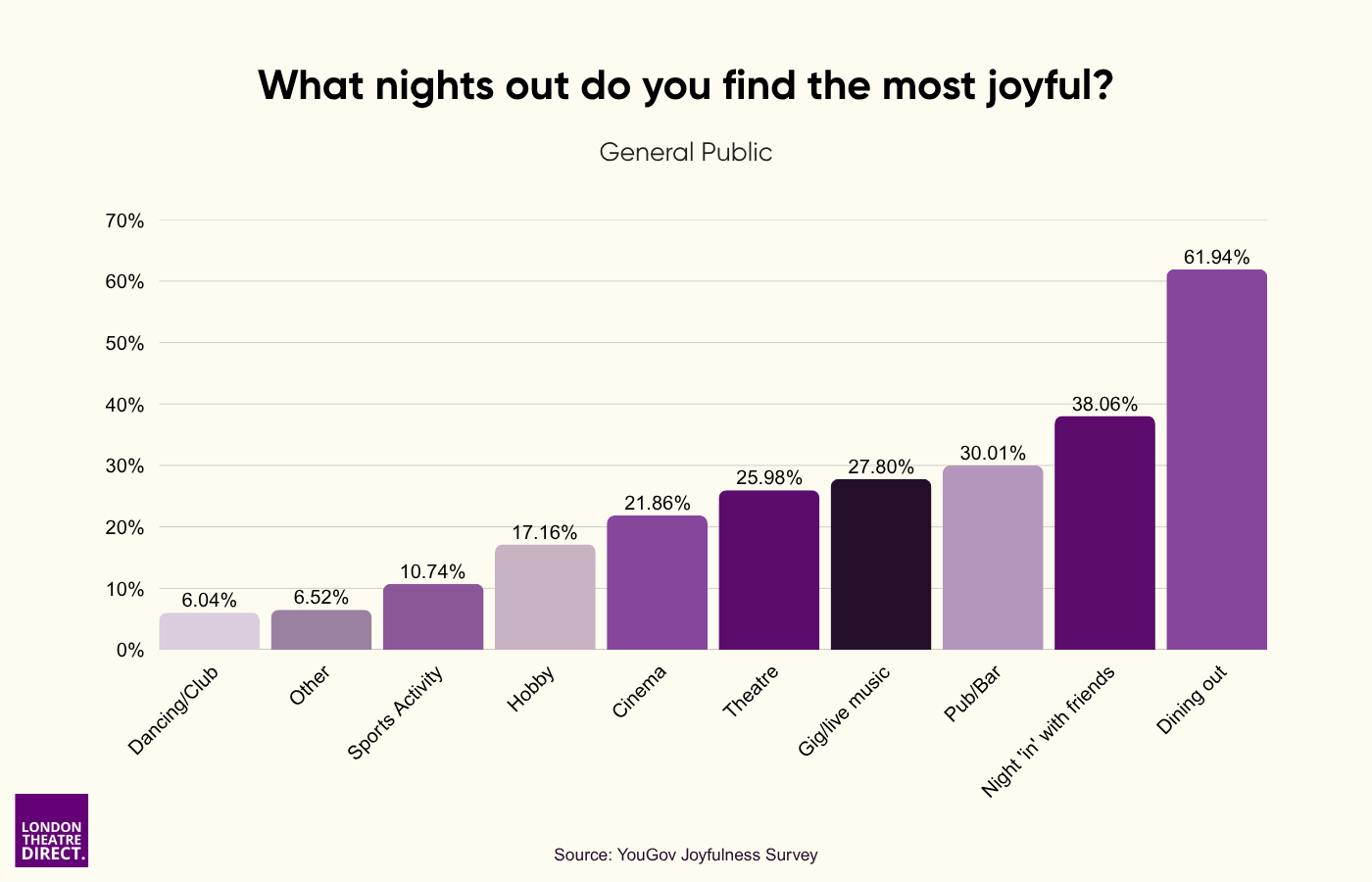
It's not just the story on stage, it's the whole experience.
When we asked people in our YouGov survey to pick the top three reasons why theatre brings them joy, the number one answer, cited by 6 in 10 people, wasthe performance itself.
But for many, it goes beyond the tangibility of the show and the actors who feature. 43% said it’s the energy of the live entertainment, and 36% pointed to the atmosphere.
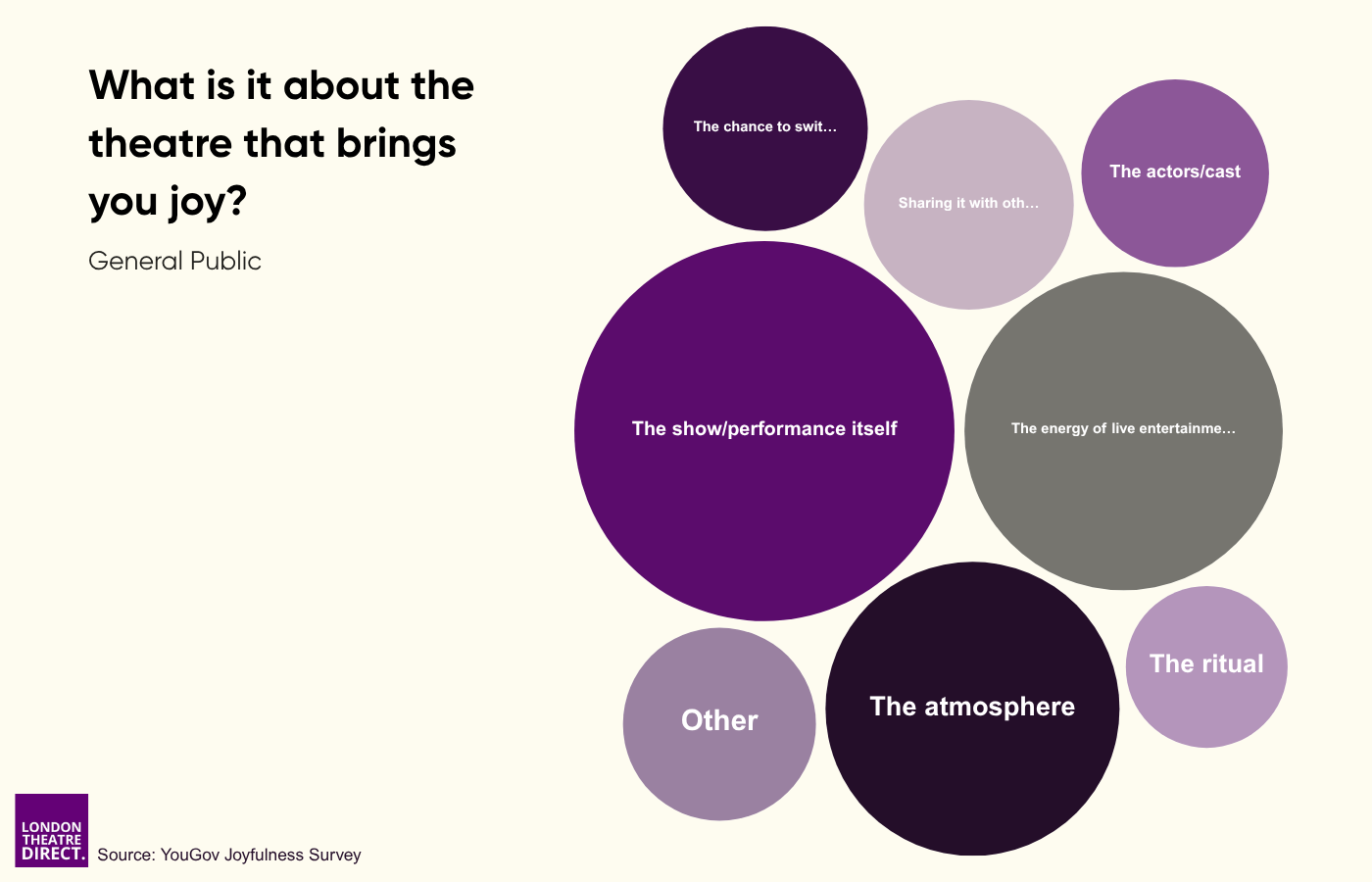
But the data also revealed differences in how this joy is distributed across the population.
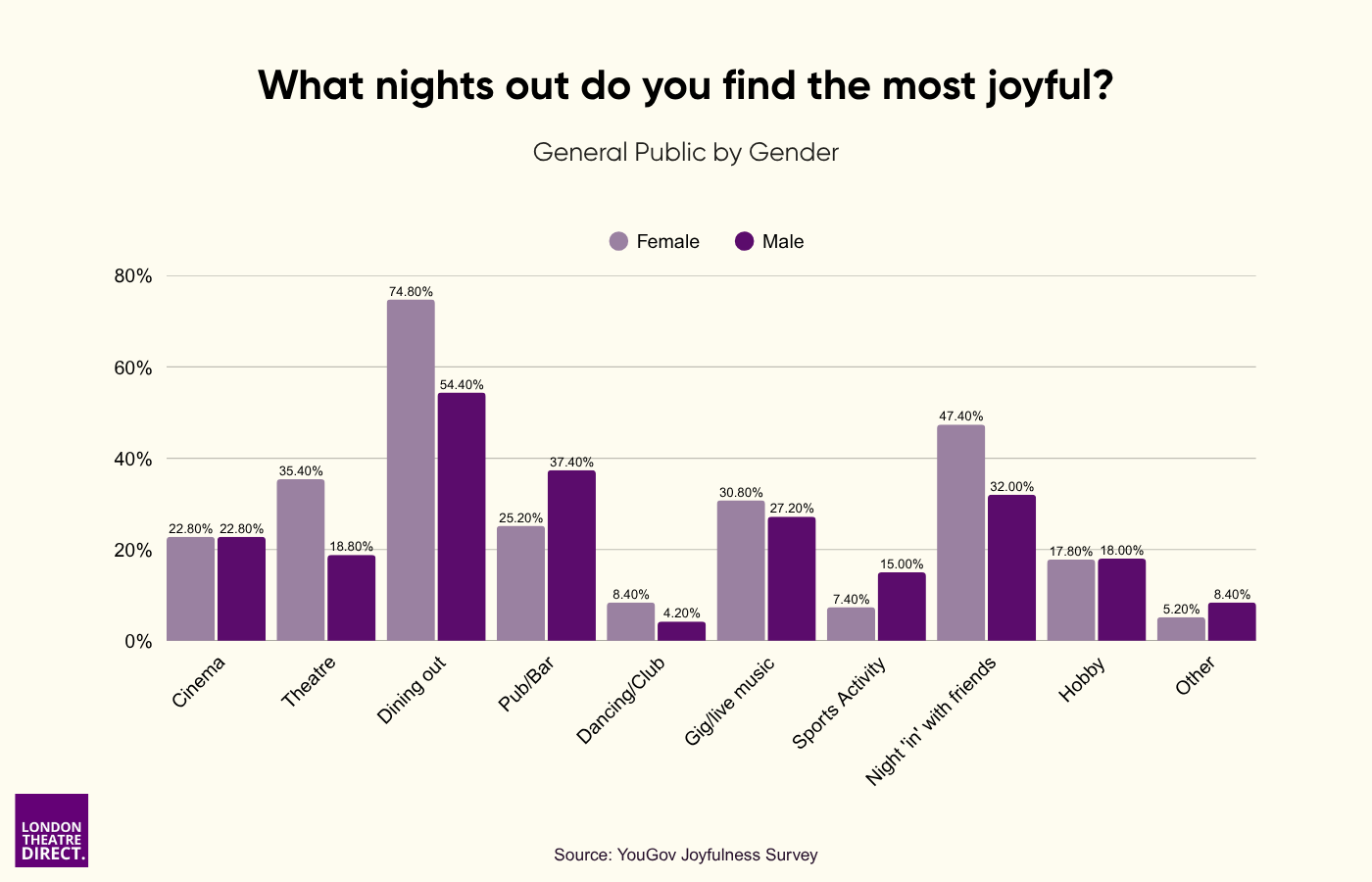
Women were nearly twice as likely as men to rank theatre among their most joyful nights out (35.4% vs. 18.8%). This contrast is particularly notable given that preferences for other activities, like cinema, gigs, or hobbies, are largely consistent across genders.
Rather than pointing to broad cultural divides, this finding simply highlights how theatre stands out from other leisure choices in how it's valued by different groups, and how it brings joy in distinct ways.
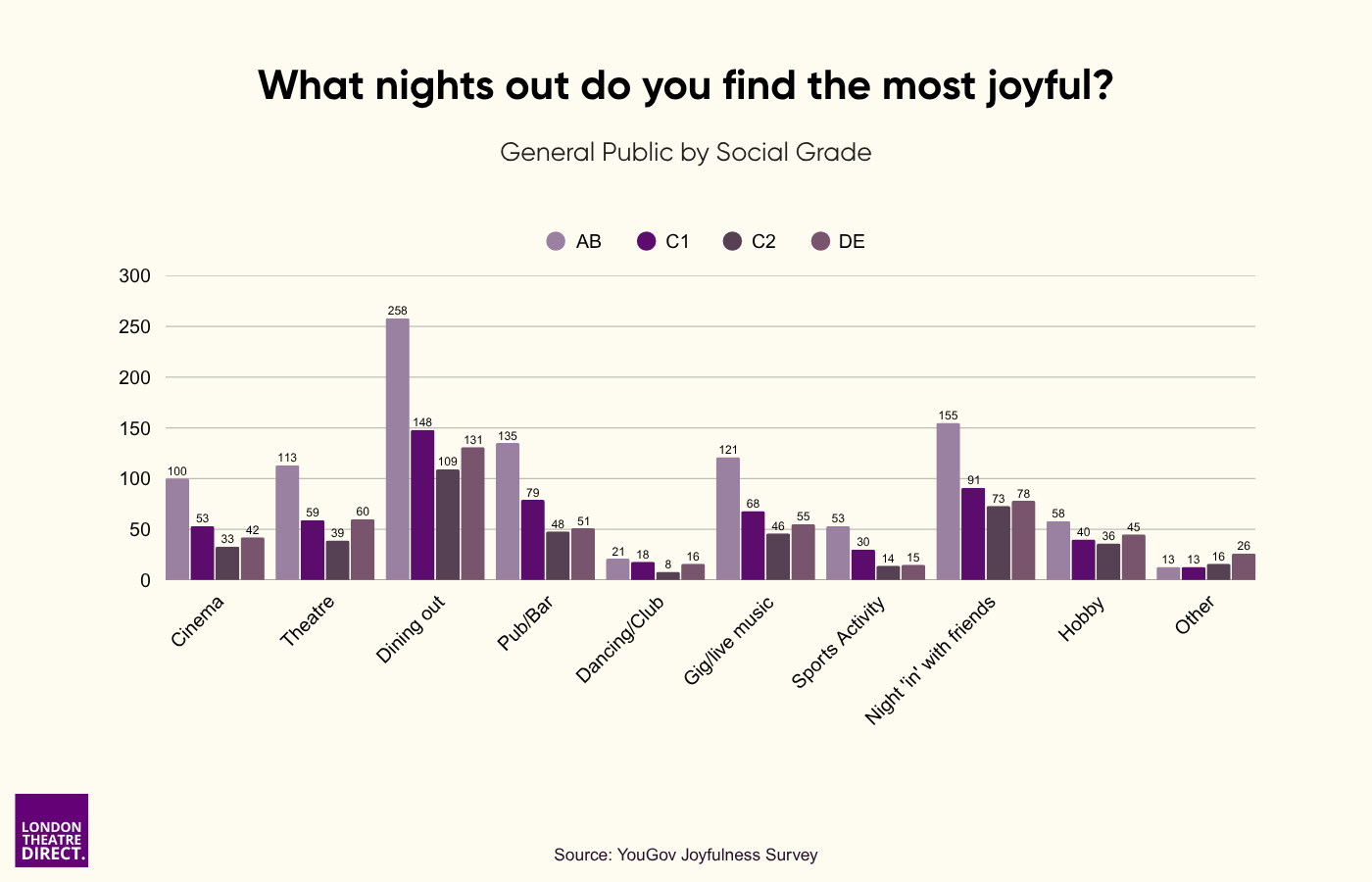
Higher-income social groups (AB) were most likely to cite theatre as joyful (29%). Interestingly, respondents from lower-income DE groups, often facing the most barriers to access, still showed high appreciation (24.4%), even more than middle-tier groups like C2s (21.8%).
But joy is just the beginning.
When we looked at how people feel after attending, there were some powerful stats, particularly among regular attendees.
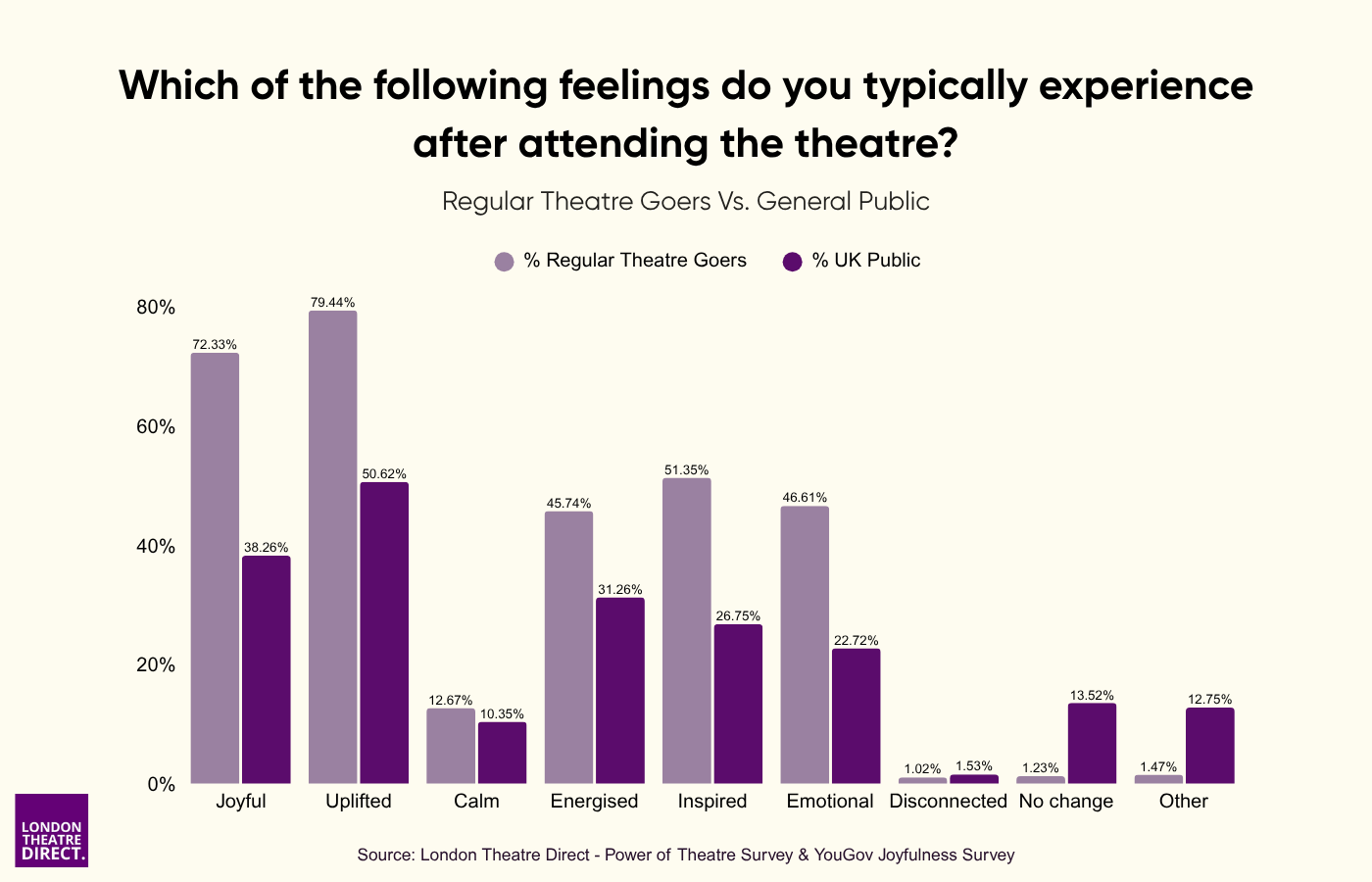
- Regular theatre goers were nearly twice as likely as the general public to leave feeling joyful (72.3% vs. 38.3%)
- More likely to feel uplifted (79.4% vs. 50.6%)
- More likely to feel inspired (51.4% vs. 26.8%)
- And emotionally moved (46.6% vs. 22.7%)

For those who attend often, the impact endures: just 1.2% report “no noticeable change” after a show, compared to 13.5% of the general population.
This gap revealed something deeper, a stronger emotional bond built over time, one that transforms theatre from a pleasant evening into a reliable source of emotional renewal.
Joy is just the beginning. It reminds us that theatre isn't reserved for a niche audience; it is a universal, emotionally rich experience.
Theatre as Emotional Infrastructure: A Space for Growth, Reflection & Connection
Among London Theatre Direct's regular audience, 77% reported experiencing strong physical or emotional reactions during a show, from tears and goosebumps to laughter and shock.
These feelings don't end when the curtain falls: 40.8% said the positive mood lasted for several days, and another 7.7% said it lingered for a week or more.
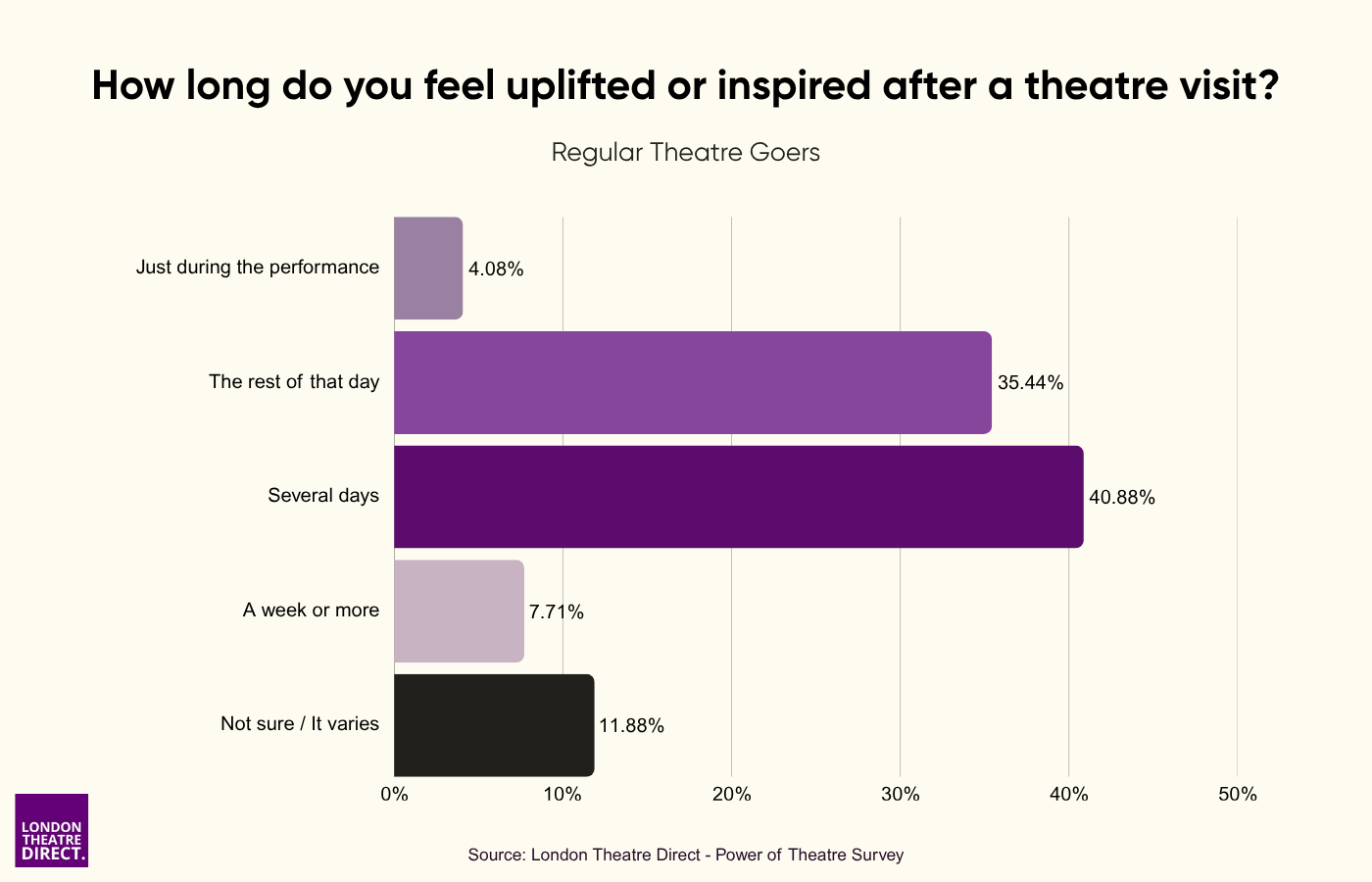
Unlike fleeting entertainment such as a 20-minute Netflix episode or scrolling TikTok, theatre provides a shared space where audiences confront, process, and reflect on life's complexities, often together.
What makes this emotional space unique is how differently it's used across generations and identities, not just in how people feel during a show, but how they carry those feelings into their lives.
Reflection and Perspective Across Ages
Theatre doesn't speak to everyone in the same way, and that's its true power. It reflects what audiences most need to see.
- Half of 18–24-year-olds say theatre helped them reflect on their lives (50.86%), with nearly as many saying it inspired them to take action (44.83%).
- 25–39-year-olds were most likely to report a sense of connection to the world around them (44.55%).
- For 40–49s and 65+, the most common outcome was more meaningful conversations (52.69% and 52.87%, respectively).
These shifts highlight how theatre adapts to different life stages, from personal transformation in early adulthood to communal dialogue in later life.
Processing Life's Challenges
The data also paints a picture of an artform that supports people during periods of emotional difficulty.
- Over one in three people aged 25–39 (35.15%) said theatre helped them process something difficult - the highest of any age group.
- Young adults (18–24) and middle-aged audiences (40–49) followed closely (29.31% and 28.74%).
- Even older audiences (65+), often underrepresented in wellbeing narratives, found value in this space (23.45%).
Emotional Engagement Across Identity
The data also reveals who feels theatre most acutely. Women aged 18–24 were most likely to report smiling uncontrollably (86%), tearing up (75%), or getting goosebumps (68%).
Interestingly, while younger audiences felt joy, older audiences, especially those aged 50–64, were more likely to report deeper physical and emotional reactions: 42.7% cried, 41.6% got goosebumps, and 45.6% laughed uncontrollably. This could suggest a variation in the preferred show type (i.e. musical vs. comedy) or that perhaps midlife audiences may engage more viscerally than their younger counterparts.
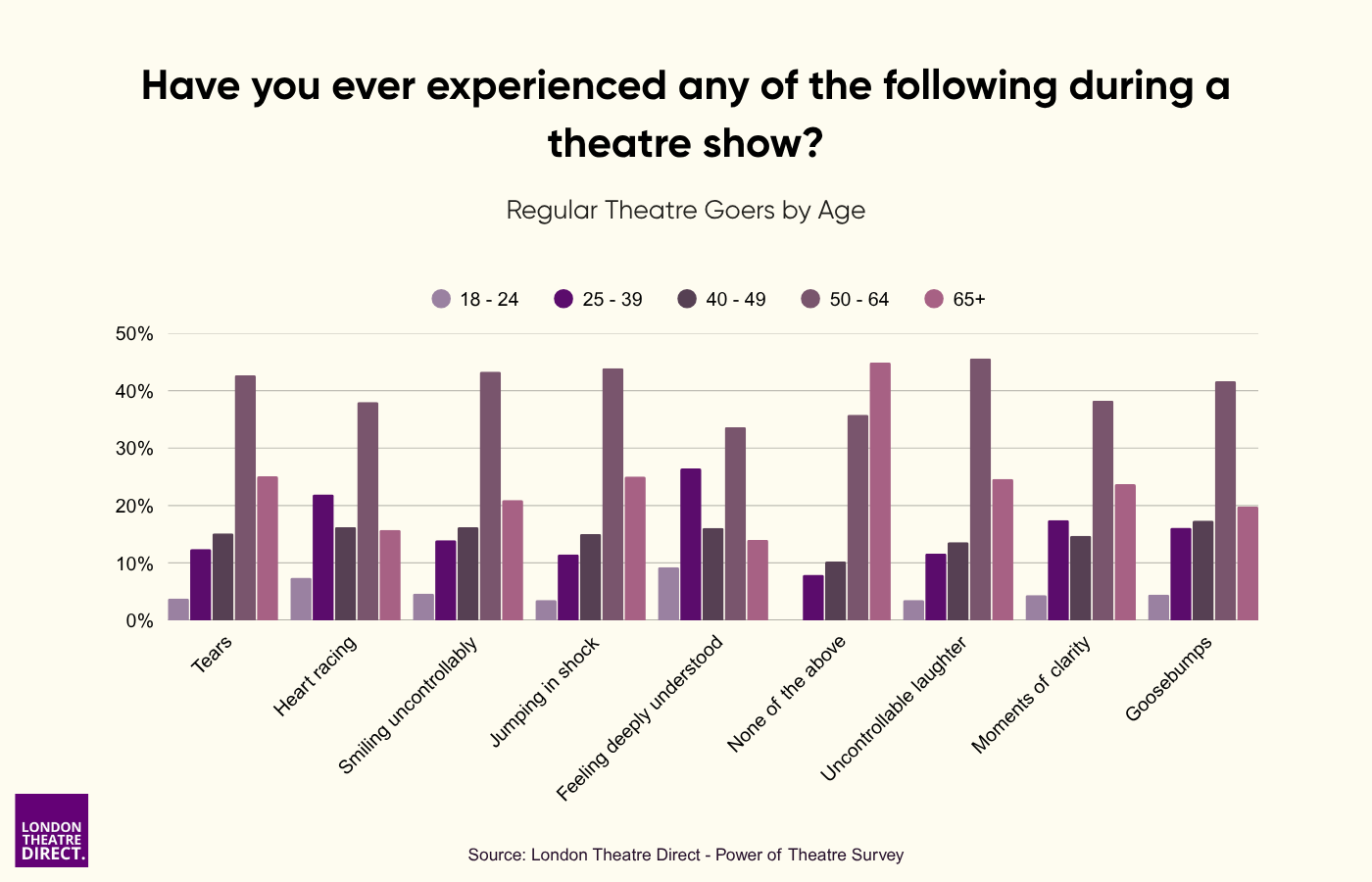
- Women aged 40–64 consistently reported strong feelings of reflection and connection.
- Non-binary 18–24s were especially likely to say theatre helped them process difficult experiences and take action, suggesting theatre plays a uniquely inclusive role.
- Older men (65+), often left out of emotional health narratives, reported surprisingly high levels of connection and conversation.
These findings underscore that emotional resonance is not just widespread, it's deeply personal. People bring their histories, identities, and expectations with them to the theatre, and they leave with something more.
The Emotional Reach of Theatre Genres
Not all theatre is felt the same way. Some stories uplift, others provoke, and some leave lasting marks. When asked which types of shows felt most meaningful, 73.7% of regular theatre-goers pointed to uplifting or feel-good musicals, making them the most resonant genre overall.
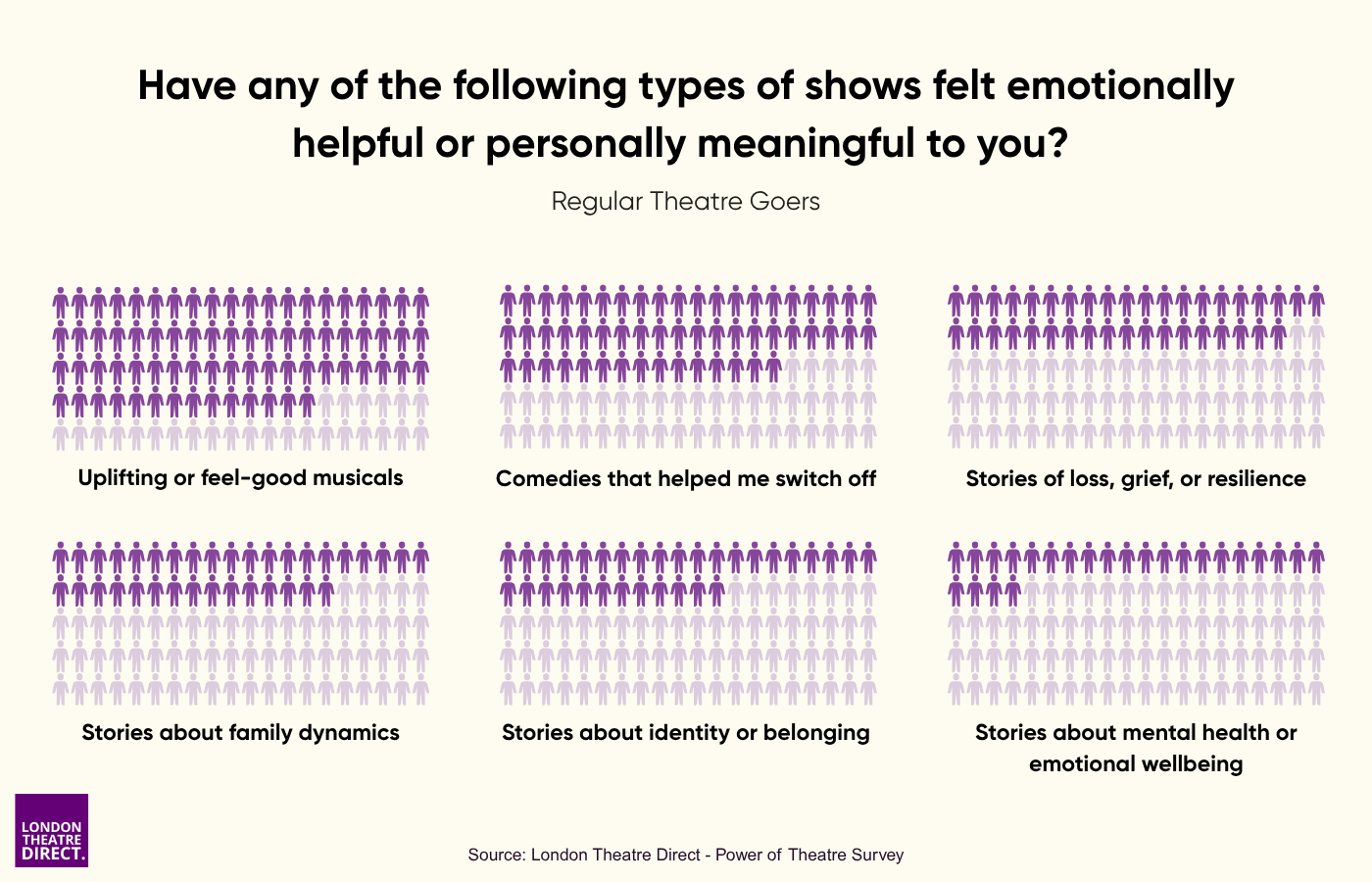
Comedies followed closely, with one in two (55.5%) saying they helped them switch off. But deeper themes also struck a chord: 38.2% connected most with stories of loss, grief, or resilience, such as Les Misérables, a powerful tale of redemption, injustice, and emotional endurance that continues to move audiences decades after its debut.
35% connected most with themes of identity and belonging, as seen in productions like Wicked, which explores Elphaba’s journey from misunderstood outsider to a powerful figure. Exploring the struggle to find oneself in the face of prejudice, a desire to belong, and the courage it takes to stay true to who you are.
32.6% connected most with narratives about mental health and emotion, like Matilda the Musical, which explores themes of neglect, resilience, and self-worth through a child's eyes, balancing humour with emotional depth.
These responses reveal that theatre's emotional power doesn't lie only in escapism or humour. For many, it is the exploration of vulnerability and real-life struggle that resonates long after the curtain falls.
As theatre continues to evolve, this insight offers clear direction. Uplifting stories remain vital, but so do those that challenge, affirm, and help audiences feel seen.
Theatre is also increasingly seen as a tool for emotional support, not just uplift. Among regular theatre-goers, more than three-quarters of people (76%) said they view theatre as a form of self-care.
In contrast, only half (46%) of the nationally representative YouGov sample said the same, suggesting that perhaps emotional connection to theatre builds with frequency.
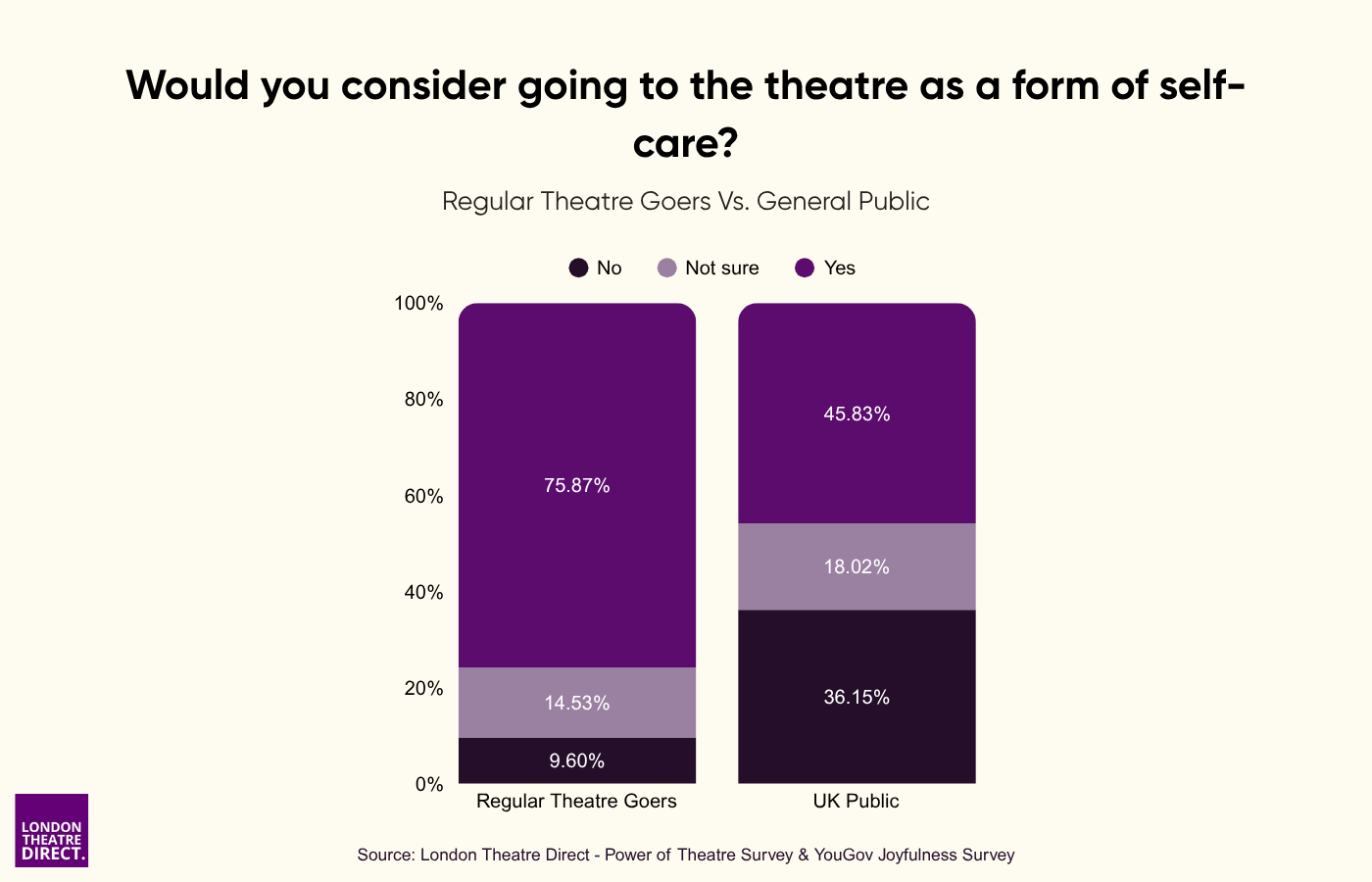
From Curtain to Conversation
In a disconnected world, theatre brings us together
Theatre's impact often extends well beyond the auditorium. For many, it becomes a space not just for emotion, but for understanding, reflection, and connection.
For 67.6% of regular theatregoers, theatre is a form of emotional escape, a way to step outside daily pressures and into something more expansive and expressive.
But that's only the beginning. Nearly half said theatre had helped them reflect on their lives or personal emotions, with one in five (19%) strongly agreeing.
These moments of clarity are often shared. After powerful performances, three in four (74%) reported having meaningful conversations sparked by what they had seen on stage.
Connection is another major theme. Over half of the respondents said theatre made them feel more in touch with others, whether through shared experiences or a new perspective. Among young men aged 18 to 24, 61.5% said theatre helped them feel more connected to the world around them, and the same number said it made difficult conversations easier to have.
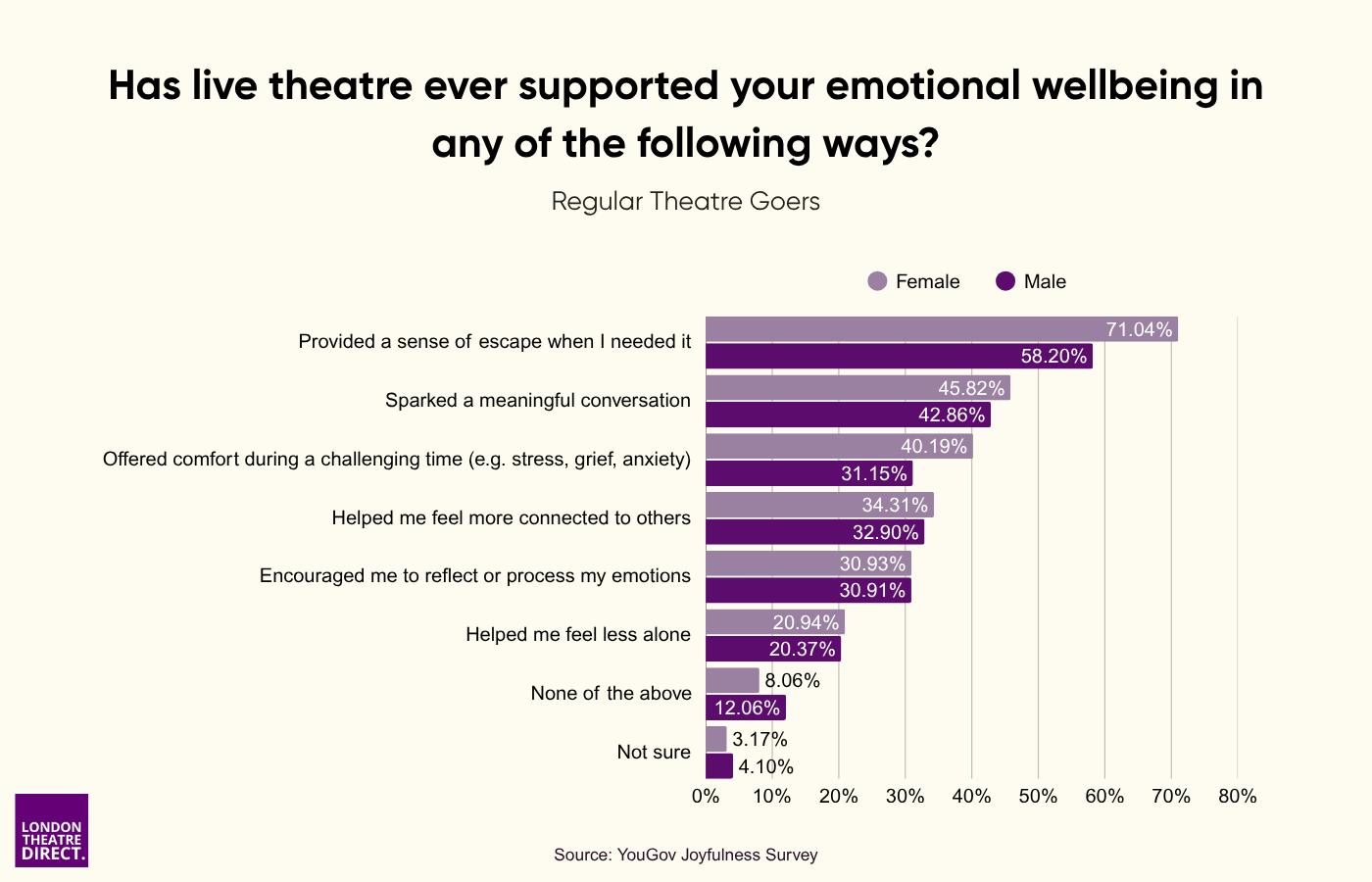
In a culture starved of deep connection, theatre offers something rare: space to feel, space to think, and space to talk.
Theatre as a Catalyst for Change
Theatre doesn't just make people feel good, it helps them think in new ways and act with greater intention.
Nearly half (44.8%) of 18–24-year-olds said theatre had inspired them to take positive action, more than double the rate of those aged 65+ (20.5%). For younger audiences navigating change and identity, theatre becomes more than escapism. It becomes a mirror, and sometimes, a catalyst.

Regular theatregoers are nearly twice as likely as the general public to leave a show feeling inspired (51.4% vs. 26.7%) or emotionally affected (46.6% vs. 22.7%). These numbers reveal how repeat attendance builds a deeper emotional connection.

Theatre doesn't need to be didactic to be impactful. Simply seeing struggle and hope reflected on stage can prompt people to re-evaluate, recharge, or re-engage with their own lives.
As one student put it:
“It's the only space where I feel like I can cry in public and come out stronger.”

These findings point to something often overlooked in live performance. It's not just storytelling, it's emotional processing, identity affirmation, and personal growth.
Feeling Together: Theatre's Communal Effect
Theatre's emotional power often becomes something shared.
For many, live performance is the starting point for deeper reflection and dialogue. In our survey, three in four respondents (74%) said theatre sparked meaningful conversations after the show.
The ripple effect is clear:
- Nearly half (48.3%) said the theatre had helped them reflect on their own life or emotions
- One in five (19%) strongly agreed that theatre helped them process something difficult
- A third (33.6%) reported feeling more connected to others after attending

These moments of shared insight aren't limited to close relationships. Theatre makes space for people to think collectively, about injustice, empathy, humour, or humanity - often across lines of age, class, or culture.
Among younger men aged 18–24, for example:
- 61.5% said theatre helped them feel more connected to the world around them
- Just as many said it made difficult conversations easier to have.
This emotional accessibility is notable, especially among groups that are often left out of wellbeing conversations.

Theatre is, at its heart, a shared space. Not just physically, but emotionally and intellectually. It creates permission to feel, to discuss, and to deepen relationships, whether through resonance with a character, discomfort with a storyline, or catharsis through laughter.
Among those most impacted, including students, disabled audiences, and frequent theatregoers, the connection runs even deeper. These groups reported higher-than-average levels of:
- Emotional resonance
- Post-show conversation
- A sense of personal relevance
When Theatre Hits Deep: Audience Spotlights
Theatre reaches everyone, but for some, it hits deeper.
Our research reveals distinct audience groups for whom theatre isn't just a night out - it's an emotional outlet, a source of comfort, or a tool for reflection. These spotlights show how theatre meets different people exactly where they are.
Students: Emotional First Responders
Students, especially those aged 18–24, emerged as the most emotionally responsive audience.
- 61% said stories about mental health resonated deeply
- Half (51%) connected with themes of grief or resilience
- Among female students, 38% highlighted both grief and comfort as emotional touchpoints
- Non-binary students in this group showed similarly high engagement (33%)
Theatre gives this group the rare emotional permission to feel openly and be seen.
Three in five (61%) of students aged 18–24 said stories about mental health deeply resonated.
Disabled Audiences: Finding Comfort
Among disabled audiences, 68% said theatre had provided comfort during difficult times, while 47% felt particularly moved by shows exploring grief or mental health.
For this group, theatre offers emotional reassurance through stories that feel seen and understood.
Retirees: Reflection Over Resonance
Retired respondents were more likely to say theatre had sparked meaningful conversations, but less likely to connect with personal themes like identity or mental health.
For this group, theatre offers a space for shared reflection more than personal catharsis.
Young Men: Quiet Engagement
Young men aged 18–24, often left out of emotional wellbeing narratives, showed high levels of quiet engagement.
- 61.5% said theatre made them feel more connected to the world around them. The same proportion said it made difficult conversations easier to have.
- More than three-quarters (78%) felt more connected to their communities, higher than any other group.

Regional Audiences: Outside London, Deeper Joy
Theatre's emotional power doesn't stop at the M25. Audiences outside London reported even deeper joy and resonance than their London-based counterparts.
Three in four reported joy, compared to just over two in three in London. Emotional impact was felt by half, versus only 43% of Londoners.

These spotlights reaffirm what many in the industry already sense: theatregoers are not a monolith.
Outside the capital, theatre remains a powerful source of joy and emotional reflection - perhaps because it's even more treasured when it feels less accessible.
From Fatigue to Focus: Theatre's Digital Reset
In a culture of endless doom-scrolling, live theatre offers something that's pretty rare: a chance to be fully present.
As screens dominate daily life, many people, especially younger and gender-diverse audiences, are feeling the effects of digital fatigue. Theatre is emerging as an unexpected remedy.
Who's Feeling the Strain?

Our research shows that screen fatigue is not evenly felt. While older audiences appear more resilient, younger and gender-diverse groups are far more likely to report overwhelm and burnout.
- More than one in three (36.4%) of non-binary respondents said they often feel overwhelmed, vs. 14.2% of women and 9.3% of men
- 22.4% of 18–24s and 24.3% of 25–39s report frequent digital fatigue
- By contrast, only 5% of respondents aged 65+ felt similarly
- Over half of over-65s (54.1%) say they rarely feel overwhelmed by screen time
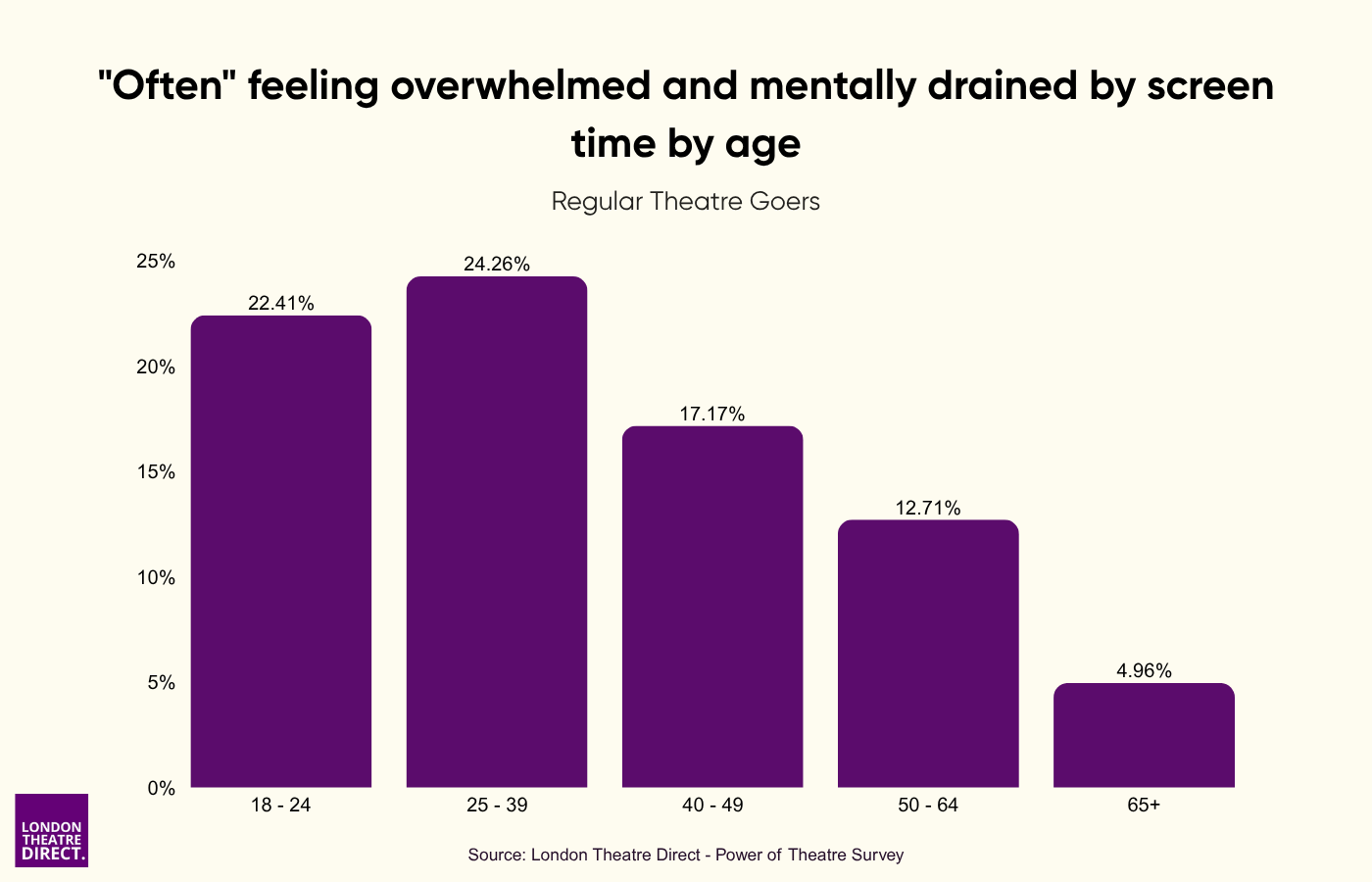
Theatre as a Mental Reset
Live theatre appears to do what screens can't: refresh the mind.
- Over half (56.1%) said they felt significantly more mentally refreshed after a live show than after screen time.
- Another third (31.7%) said they felt somewhat more refreshed.
- Fewer than 10% noticed no difference, and almost nobody felt worse.
When broken down by gender:
- 63.6% of non-binary respondents felt “much more” refreshed
- 59.6% of women agreed, and nearly half of men (46.7%)
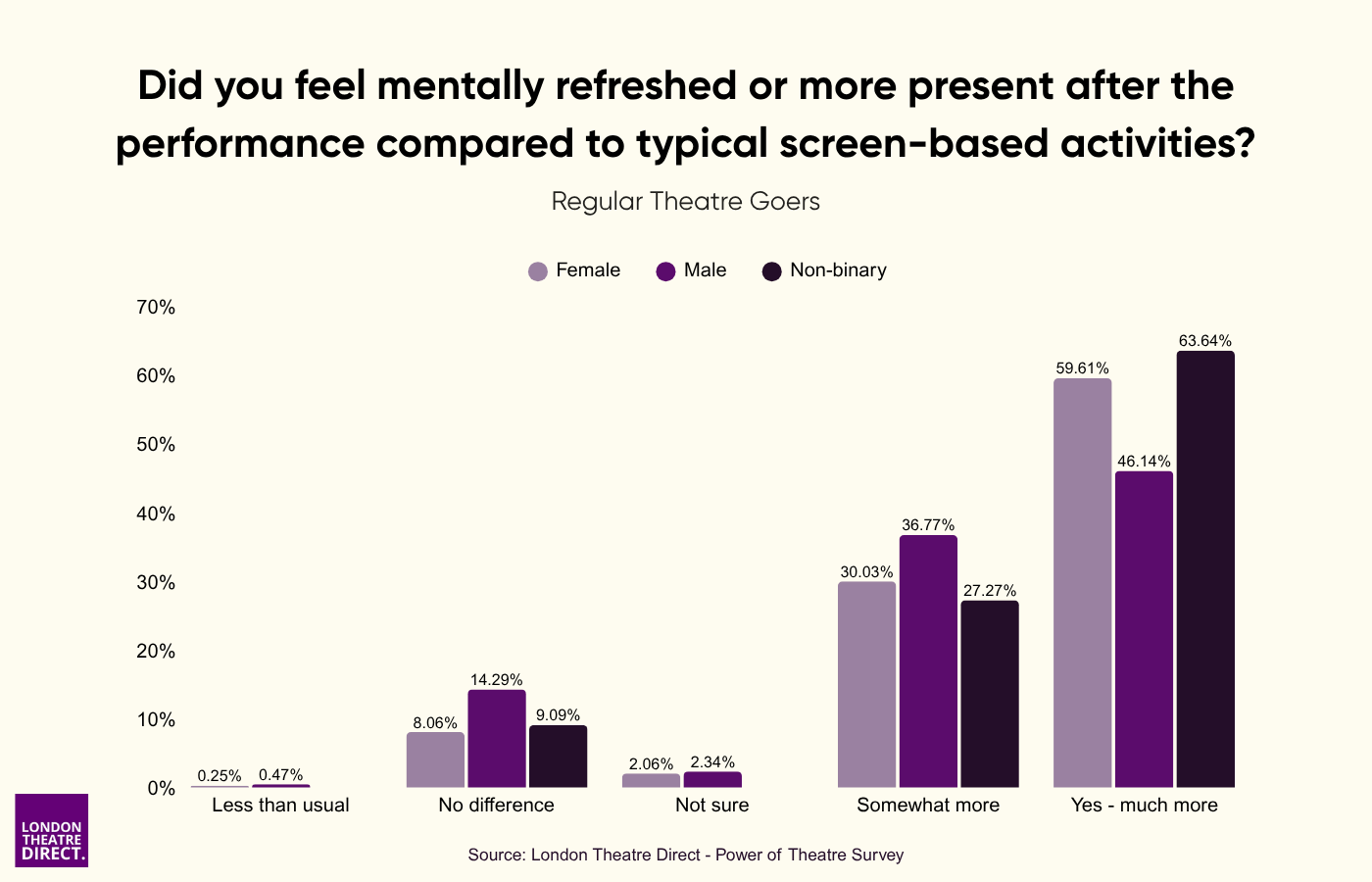

Disconnecting from Tech
Do audiences actively see theatre as a break from technology? Most say yes, especially younger viewers.
- 65.8% said yes
- Nearly one in three (28.6%) hadn't thought about it before
- Just 5.5% said no
Among genders:
- 67.3% of men said they value theatre for this reason
- 65.5% of women agreed
- Nearly half (45.5%) of non-binary respondents said the same
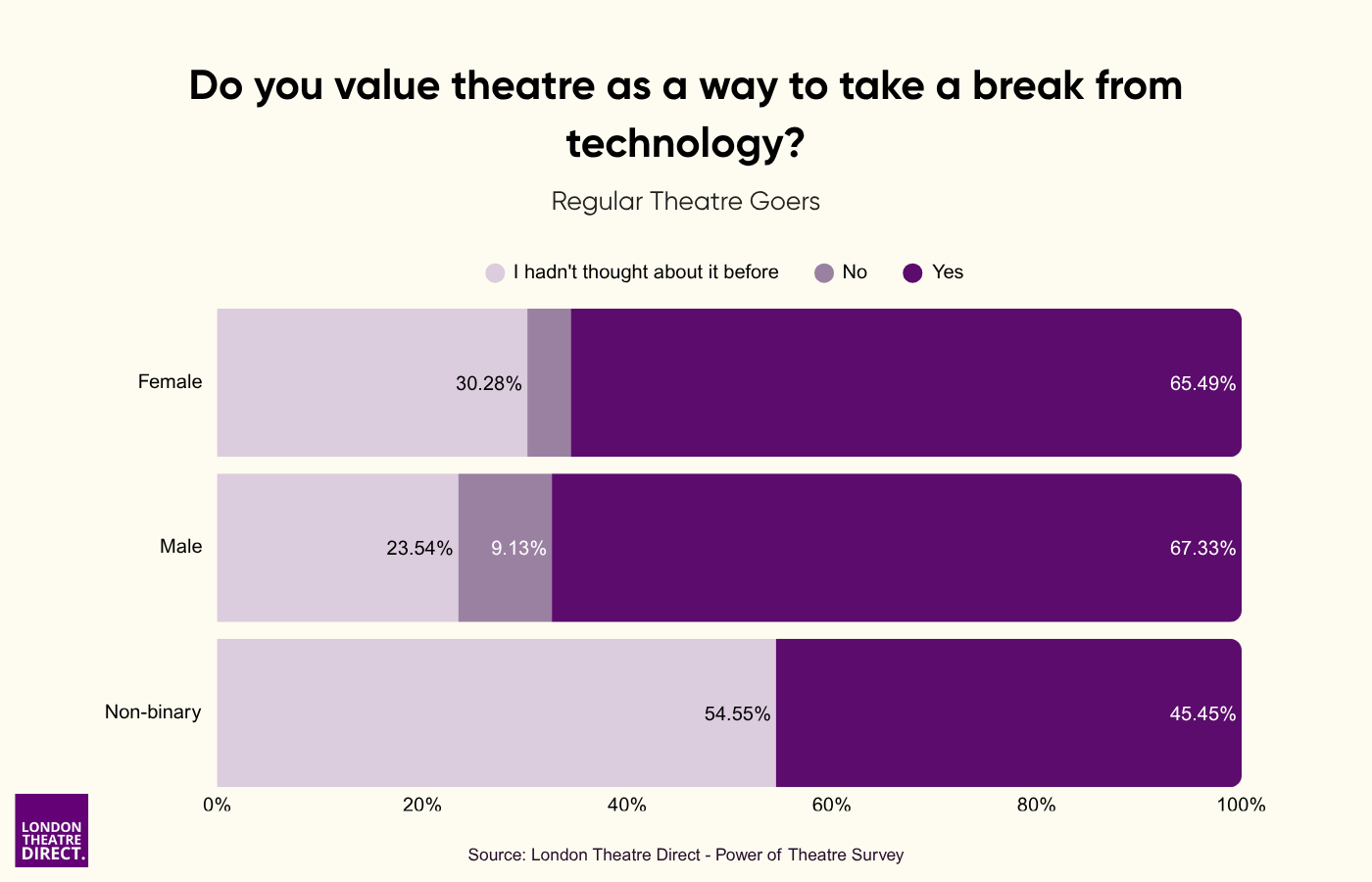
Women were more likely to feel the benefit than to name it: 30.3% hadn't consciously linked theatre to digital detox, compared to 23.5% of men. This may suggest that men are more likely to consciously associate theatre with digital downtime, whereas women may feel the benefit without naming it.
By age:
- More than three-quarters (76.5%) of 25–39s see theatre as a digital detox
- Followed by 74.1% of 18–24s
- The number drops to 64.3% for 50–64s and 58.1% for 65+
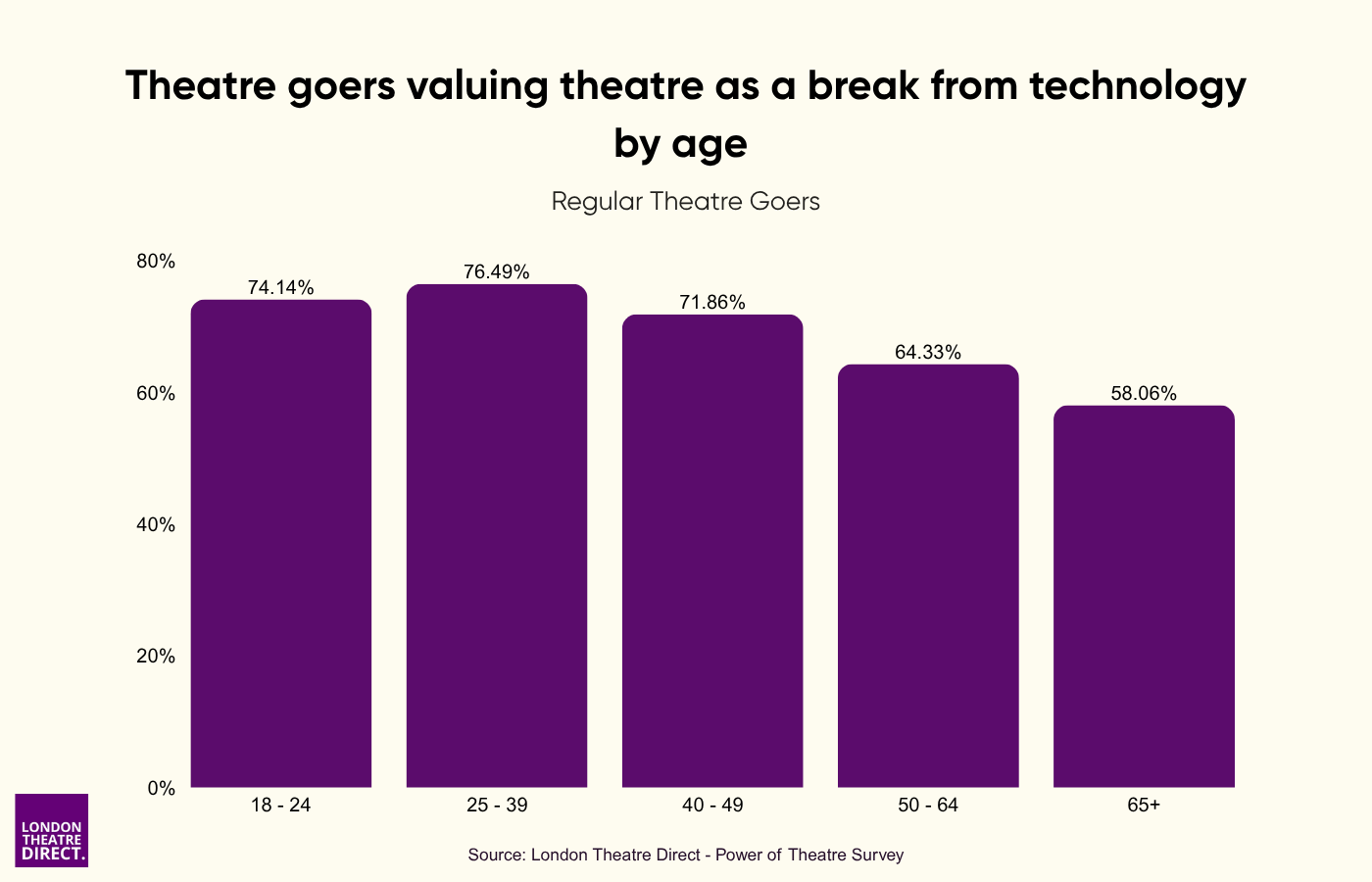
In a culture of distraction, theatre offers something vital: attention, depth, and presence.
For those who need it most, young, screen-fatigued, emotionally engaged, theatre delivers a rare sense of clarity that few other activities can provide.
The Emotional Afterglow
One truth cuts through all our findings: live performance supports wellbeing not just in the moment, but long after the curtain falls.
Audiences report feeling uplifted, inspired, and more present, not just during a show, but for days or even weeks afterwards.
For many younger and emotionally engaged audiences, including students, non-binary individuals, and frequent attendees, theatre is more than just a night out - it's a support system.
They cry, laugh, reflect, and talk more freely because of what happens on stage. They return, not out of habit, but because the impact lingers.
At a time when connection is rare, when clarity is hard-won, and when depth of feeling is often buried under distraction, theatre offers all three, and does so in a way no screen ever could.
It's not just a cultural treat. It's emotional infrastructure.
